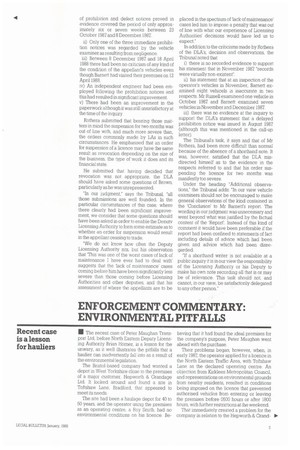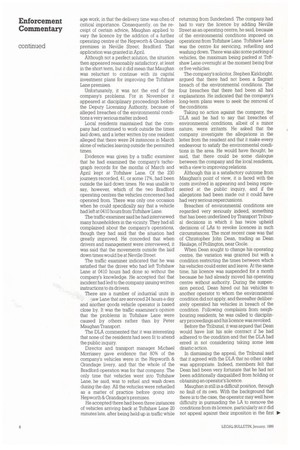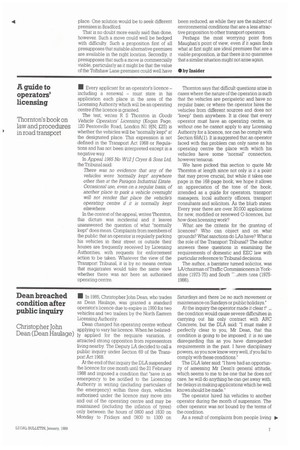ENFORCEMENT COMMENTARY: ENVIRONMENTAL PITFALLS
Page 91

Page 92

Page 93

If you've noticed an error in this article please click here to report it so we can fix it.
Recent case is a lesson for hauliers
The recent case of Peter Maughan Transport Ltd, before North Eastern Deputy Licensing Authority Brian Homer, is a lesson for the unwary, as it well illustrates the pitfalls that a haulier can inadvertently fall into as a result of the environmental legislation.
The Bristol-based company had wanted a depot in West Yorkshire close to the premises of a major customer, Hepworth & Grandage Ltd. It looked around and found a site in Toftshaw Lane, Bradford, that appeared to meet its needs,
The site had been a haulage depot for 40 to 50 years, and the operator using the premises as an operating centre, a Roy Smith, had no environmental conditions on his licence. Be
lieving that it had found the ideal premises for the company's purpose, Peter Maughan went ahead with the purchase.
Their problems began, however, when, in early 1987, the operator applied for a licence in the North Eastern Traffic Area, with Toftshaw Lane as the declared operating centre. An objection from ICirldees Metropolitan Council, and representations on environmental grounds from nearby residents, resulted in conditions being imposed on the licence that prevented authorised vehicles from entering or leaving the premises before 0500 hours or after 1800 hours, with further restrictions at the weekend.
That immediately created a problem for the company in relation to the Hepworth & GrandP. age work, in that the delivery time was often of critical importance. Consequently, on the receipt of certain advice, Maughan applied to vary the licence by the addition of a further operating centre at the Hepworth & Grandage premises in Neville Street, Bradford That application was granted in April.
Although not a perfect solution, the situation then appeared reasonably satisfactory, at least in the short term, but it did mean that Maughan was reluctant to continue with its capital investment plans for improving the Toftshaw Lane premises.
Unfortunately, it was not the end of the company's problems. For in November it appeared at disciplinary proceedings before the Deputy Licensing Authority, because of alleged breaches of the environmental conditions a very serious matter indeed.
Local residents maintained that the company had continued to work outside the times laid down, and a letter written by one resident alleged that there were 24 instances in March alone of vehicles leaving outside the permitted times.
Evidence was given by a traffic examiner that he had examined the company's tachograph records for the months of March and April kept at Toftshaw Lane. Of the 230 journeys recorded, 41, or some 17%, had been outside the laid down times. He was unable to say, however, which of the two Bradford operating centres the vehicles concerned had operated from. There was only one occasion when he could specifically say that a vehicle had left at 0410 hours from Toftshaw Lane.
The traffic examiner said he had interviewed many householders in the vicinity. They had all complained about the company's operations, though they had said that the situation had greatly improved. He conceded that when drivers and management were interviewed, it was said that the movements outside the laid down times would be at Neville Street.
The traffic examiner indicated that he was satisfied that the driver who had left Toftshaw Lane at 0410 hours had done so without the company's knowledge. He accepted that that incident had led to the company issuing written instructions to its drivers.
There are a number of industrial units in _ taw Lane that are serviced 24 hours a day and another goods vehicle operator is based close by. It was the traffic examiner's opinion that the problems in Toftshaw Lane were caused by others rather than by Peter Maughan Transport.
The DLA commented that it was interesting that none of the residents had seen fit to attend the public inquiry.
Director and transport manager Michael Morrissey gave evidence that 80% of the company's vehicles were in the Hepworth & Grandage livery, and that the whole of the Bradford operation was for that company. The only time that vehicles went into Toftshaw Lane, he said, was to refuel and wash down during the day. All the vehicles were refuelled as a matter of practice before going into Hepworth & Grandage's premises He accepted there had been three instances of vehicles arriving back at Toftshaw Lane 20 minutes late, after being held up in traffic while returning from Sunderland. The company had had to vary the licence by adding Neville Street as an operating centre, he said, because of the environmental conditions imposed on operations from Toftshaw Lane. Toftshaw Lane was the centre for servicing, refuelling and washing down. There was also some parking of vehicles, the maximum being parked at Toftshaw Lane overnight at the moment being four or five vehicles.
The company's solicitor, Stephen ICirkbright, argued that there had not been a flagrant breach of the environmental conditions. The four breaches that there had been all had explanations. He indicated that the company's long-term plans were to seek the removal of the conditions.
Taking no action against the company, the DLA said he had to say that breaches of environmental conditions, albeit of a minor nature, were irritants. He asked that the company investigate the allegations in the letter from the resident and that it make every endeavour to satisfy the environmental conditions in the area. He would have thought, he said, that there could be some dialogue between the company and the local residents, with a view to improving relations.
Although this is a satisfactory outcome from Maughan's point of view, it is faced with the costs involved in appearing and being represented at the public inquiry, and if the allegations had been made out it could have had very serious repercussions.
Breaches of environmental conditions are regarded very seriously indeed, something that has been underlined by Transport Tribunal decisions in which it has twice upheld decisions of LAs to revoke licences in such circumstances. The most recent case was that of Christopher John Dean, trading as Dean Haulage, of Pollington, near Goole.
When Dean sought to change his operating centre, the variation was granted but with a condition restricting the times between which his vehicles could enter and leave. At the same time, his licence was suspended for a month because he had already moved his operating centre without authority. During the suspension period, Dean hired out his vehicles to another operator to whom the environmental condition did not apply, and thereafter deliberately operated his vehicles in breach of the condition Following complaints from neighbouring residents, he was called to disciplinary proceedings and his licence was revoked.
Before the Tribunal, it was argued that Dean would have lost his sole contract if he had adhered to the condition and that the DLA had erred in not considering taking some less drastic action.
In dismissing the appeal, the Tribunal said that it agreed with the DLA that no other order was appropriate. Indeed, members felt that Dean had been very fortunate that he had not been additionally disqualified from holding or obtaining an operator's licence.
Maughan is still in a difficult position, through no fault of its own With the background that there is to the case, the operator may well have difficulty in pursuading the LA to remove the conditions from its licence, particularly as it did not appeal against their imposition in the first O. place. One solution would be to seek different premises in Bradford.
That is no doubt more easily said than done, however. Such a move could well be hedged with difficulty. Such a proposition first of all presupposes that suitable alternative premises are available in the right location. Secondly, it presupposes that such a move is commercially viable, particularly as it might be that the value of the Toftshaw Lane premises could well have been reduced, as while they are the subject of environmental conditions that are a less attractive proposition to other transport operators.
Perhaps the most worrying point from Maughan's point of view, even if it again finds what at first sight are ideal premises that are a viable proposition, is that there is no guarantee that a similar situation might not arise again.
• by Insider
































































































